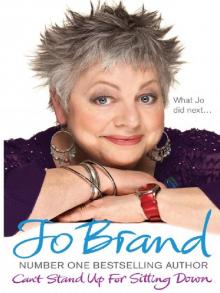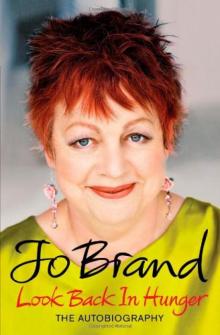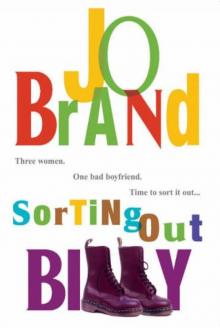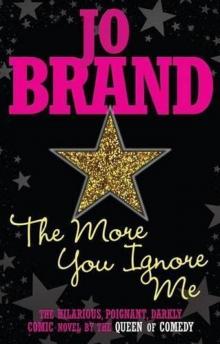Look Back in Hunger Read online
Page 18
I tried to think about how I could best get into stand-up. There were no comedy courses as such, so I figured the best way was to train as an actress and use that as an in. I applied to drama schools and had about five auditions lined up. The first one was at Mountview Theatre School in Crouch End, and I dutifully learned my prepared pieces and shuffled along there, hoping for the best.
It didn’t go well. First of all, a sizeable number of my fellow auditionees struck me as complete drama queens. During the set-piece auditions, one woman did a passage from the play Saint Joan and really got stuck in, at one point lying on the floor, foaming at the mouth. I wondered uneasily if she was actually having an epileptic fit and whether I should offer my services, but it was genuinely just VERY BIG acting. She, in fact, was the only one of our group who got a place and, for all I know, she is now Dame Someone-Or-Other.
There was also an improvisation section, and improvisation has been my bête noire ever since. The reason for this is that I’m absolutely crap at it. I’ve always felt that I don’t have a fast enough brain to come up with ideas quickly. I think it’s always very helpful for an improviser to be a good mimic, and I’m not. The only two impressions I can do are Brian Walden, who was a presenter on political telly shows in the seventies, and a very bad Janet Street-Porter. And, let’s face it, that pair aren’t particularly going to impress audiences.
We all had a number hung round our necks and were invited to spread ourselves out in the hall. Then we were asked to mime playing a musical instrument. Most people chose something sensible, like a clarinet or a violin, but I decided to give it large and plumped for a church organ. There I was, banging away like a mad woman, when suddenly our two remarkably camp auditioners said, ‘Right, that’s enough, will you now fold up your instrument and put it on the floor?’
Fuck me, how do you fold up an organ?
Well, I decided I’d better go for it and spent ages running up and down trying to match the corners of the bleeding thing together.
I’ve always wanted to play the organ, so I was really pleased when the BBC asked me if I’d like to learn an instrument for their Play It Again series in 2008, in which so-called celebrities learn to play an instrument. I had an absolutely brilliant six months doing the programme. I was given an organ teacher called Hilary, a very posh bloke who’d worked as head of music at a boys’ public school and was also a conductor. The signs weren’t good; normally I hate this sort of individual. But he turned out to be an absolute delight and a fantastic teacher. Surprisingly liberal, very funny and kind, he was extremely patient with me as we worked our way through various pieces for different events that were to be filmed. I played a hymn at the church in Benenden, where I went to school, ‘Ave Maria’ at a wedding in Peckham and a waltz for some dancers at the Tower Ballroom in Blackpool.
I’ll give you an idea of what my work days are like occasionally—not quite the twenty minutes’ work I’d originally envisaged.
I had to work the day before we filmed at Blackpool, so I drove up there from London the night before. I left London at nine and arrived in Blackpool at two in the morning. I got an alarm call at five thirty and we were filming by six thirty. We did a thirteen-hour day and then, because I had to be back in London the following morning, I drove back that night on three hours’ sleep and arrived home at midnight. I’m not touting for sympathy; it’s my own fault because I like driving myself. This is because I seem to spend so much of my life talking endlessly to people and I really appreciate having some time on my own in the car, choosing what I listen to and not having to make polite conversation. So it serves me right, obviously.
The denouement of the organ lessons was that I had to play Bach’s Toccata in D Minor at the Royal Albert Hall during a Christmas concert. I was slotted in as a surprise and I think it is probably the most nervous I have ever been. Mainly because I knew I wasn’t allowed to talk to the audience and do jokes. I had all the classic symptoms of extreme anxiety and was slightly worried I might wet myself. I had a dry mouth, my hands were shaking, I felt freezing cold and yet I was sweating, and I was seriously concerned my fingers would turn to jelly and wobble uselessly over the keys.
There were 8,000 people there. Hilary told me not to stop, whatever happened. I sat down at the keys, raised my hands … And that’s all I remember about it. The whole thing is a complete blur. I didn’t stop, I didn’t cock up too badly and the whole thing was an absolutely unique experience.
So anyway, after the humiliation of folding the organ was over, we had to stand facing our torturers as they called out our numbers. One by one, we put our hands up and they conferred and put a mark down on their clipboards. When they came to me and I raised my hand in the air, they just pissed themselves laughing, I’m sad to say. Not an actor then.
So I haven’t gone for many acting jobs in my career because I was pretty sure I wouldn’t get them. I once did a cameo role in Jennifer Saunders’s sitcom Absolutely Fabulous and got roundly slagged by the critics for my lack of ability.
But my most magical audition, which I simply couldn’t turn down, was for a role in Harry Potter, playing a hideous old aunt of Harry who fills up with air and floats up into the sky. When this request came through, my daughter Eliza was only six weeks old, but I just had to go, so I took her with me. It was at a studio just off the M1 and it was a foggy, cold, wintry night. The studio plot was so huge that I was guided through it by a Land Rover. When I arrived, Eliza was asleep and the receptionist sat outside the audition room keeping an eye on her. I went into the room and met the casting director, the Mexican director and someone else, who never really introduced themselves. I had to read two pages of script and was asked to do it about thirteen times. Each time they asked me to do it again, I became slightly more hopeful. They gave absolutely no indication as to whether they thought I was any good and said they would contact me.
They did, the next day, to say I hadn’t got it because I was too young, even though I was very good. So that is what I chose to believe, rather than I was crap. Pam Ferris actually got the part and I do not begrudge her it one little bit. She’s a brilliant actress whom I’ve always loved.
Of course, I didn’t get into Mountview and I subsequently cancelled the other auditions I had lined up, thinking that I probably couldn’t stand the humiliation.
So, in need of some money and some work, I ended up applying to the Maudsley Hospital, where I had trained, for a staff nurse post. This felt like a little defeat in some ways, as I’d had high hopes of people queuing up to give me a job, but in reality I had a degree and a nursing qualification, not an Oxbridge degree and a wealthy mummy and daddy.
I was offered a job at the emergency clinic, which I accepted. The emergency clinic was a wonderful idea and a great department. It operated like a casualty department for people with mental health problems and had no specific catchment area, so anybody that wanted to could walk into the place at any time of the day or night, seven days a week, and request a psychiatric assessment for themselves or a member of their family. It was situated in the outpatients department, for which the nursing team was also responsible, but the clinic had a separate little suite of rooms containing seats and desks in which staff could interview those who had turned up. It operated like casualty too in the sense that people had to wait their turn unless we felt they were too disturbed to sit in a chair. Believe me, there were plenty of those, which meant the poor mild and manageable people had to wait even longer.
This suite of rooms contained the infamous Room One, a larger room with virtually nothing in it, designed to help us staff look after those who were difficult to control and needed more space to pace around in. There was a desk, chair and soft bed beside the wall. Often we had to restrain and sedate people in this room, something none of us liked doing because it made us all feel like Nurse Ratched from One Flew Over the Cuckoo’s Nest.
As well as running the outpatients department, which meant just checking that the rooms were tidy or
occasionally chaperoning doctors who were worried a patient was going to lamp them, we also ran a clinic for those with schizophrenic-type illnesses who were on long-acting medication which required having an injection roughly once a month. These injections were designed to remove the need to take tablets every day. They were known as long-acting phenothiazines, which are basically anti-psychotic drugs to dampen down the symptoms of illnesses like schizophrenia. The monthly injections meant that people who might not be very reliable at taking three tablets three times a day would get the treatment their doctor wanted them to have. Rather than trying to avoid giving huge numbers of injections, I decided this should be an opportunity to get better at it, although I pity the first fifty or so that got my needle in their bums.
What I loved about the emergency clinic was the fact that no two days were the same. Sometimes it was raging, other days very quiet.
Our modus operandi was to take down the details of anyone who pitched up and enter them into a log book, get their notes from our medical records if we already knew them, and assess them. Experienced nurses normally did initial assessments and just collared a doctor to tick a box, in effect, if nothing needed to be done. But in the vast majority of cases, referrals needed to be made or admissions arranged, so the case automatically went on to a doctor.
We also covered the whole of south London for what are called section 136s. This is a section of the Mental Health Act that the police use in order to remove someone from the streets who is either a risk to themselves or others. In order to stand out in the bustling and action-packed part of London in which we were located, you have to be behaving pretty bloody badly. So when we knew the police were on their way, the atmosphere became more highly charged.
The people we saw could be split into discrete groups: those we’d never met, those we knew vaguely and the regulars. The regulars could be divided up also: patients in the long-term unit, who liked visiting to have a moan, scrounge fags or sit down for a rest in our comfy chairs, and outpatients, who were kind of dependent on us for support and a social life. Quite a few were only too happy to come and tell us when they were pissed, sad, happy or frustrated and they just melded in with the waiting gang of others. Occasionally we had to chuck them out if we were too busy or they were being annoying and intimidating others.
We used to see all sorts of people: old and young, sweet and absolutely horrible, drunk and sober, scary and lovely. It was important to be able to accept that anything was going to happen and any sort of person might come through the door, from a weeping young mother plus baby to a knife-wielding drug dealer; an elderly, confused man to a posh bloke in a suit with depression. Anything went.
Accommodationwise, I started off in the nurses ‘home and then moved into a fantastic Georgian house in Camberwell, which I shared with the sister of a friend and two male anaesthetists who became my very good friends.
They came in very useful one weekend. I had been to the local dental school to have my wisdom teeth removed, and what this means is letting a student loose on your mouth, which is slightly terrifying. In my case, my dental student was very small and pretty and sweet, but had no strength to speak of and she ended up kneeling on my shoulder in order to get enough purchase to pull out my teeth. Excruciating and farcical all at the same time.
After the deed had been done (she stopped at three because I was very worried I might actually punch her), I lay on the chair, bloodied and defeated, trying to hold it together. She said she’d write me up for some medication. But as I staggered to the pharmacy to collect my mega painkillers, or so I thought, I glanced down at the prescription to see she had written me up for two paracetamol four times a day. I was full of rage but had no more strength left, so I staggered to my car and tried to get home without crashing.
After a few hours at home, the anaesthetic began to wear off and the most appalling pain flooded over me. I have to say that it was even worse than childbirth. I found myself on my hands and knees, crawling round the floor and banging my head on it, in the hope that an alternative source of pain might mask the unbearable drilling pain in my mouth. In desperation, I called one of my flatmates and begged him to bring ‘something decent’ home for me. Thank the Lord he did, and I spent the weekend in a fog of extraordinarily strong druginess, hallucinating away and thanking my lucky stars I lived with a doctor.
While I was a staff nurse at the emergency clinic, I joined the British Transcultural Society. This was an organisation set up to address the problems faced by ethnic-minorities in this country in the arena of psychiatry. For example, four times more Afro-Caribbeans are diagnosed as schizophrenic than the indigenous white population. Unless they really are carrying some stronger gene for schizophrenia, which is completely unlikely, I feel strongly there is some cultural misunderstanding going on. And I saw it in action. One day a very disturbed Rasta was brought in by the police and we arranged for one of the relatively new junior doctors to see him, a very sweet-natured, white, middle-class man. The Rasta, obviously not happy with his lot, was swearing and abusing all and sundry. As this doctor came in to see him, he was greeted with a torrent of abuse— ‘Ras clot, blood clot!’—whereupon the doctor politely enquired whether he was worried he had a blood clot. I had to take him aside and explain. It’s a very common Afro-Caribbean term of abuse, which I was told relates to sanitary towels—i.e. blood clot/blood cloth. Perhaps this is true, perhaps it ain’t.
There has also been much debate about cannabis psychosis. In other words, can cannabis alone generate a psychotic illness, one which makes you lose touch with reality? Well, on a very simplistic level, I think not. It can certainly exacerbate an existing condition, in my experience, although these days the cannabis on sale seems a great deal stronger than the slightly pathetic makes-you-laugh-makes-you-hungry stuff we used to suck on. I tried something relatively recently called ‘Double Zero’ and, God, hallucinating and everything. If you believe, as I do, that psychotic illnesses are intimately linked with a chemical imbalance in the brain, the stronger drugs are, the more likely one is to suffer.
From time to time journalists appeared in the emergency clinic, I presume because they thought it would make exciting reading. One journalist from The Times stayed for a week and was starting to become a little bit too intrusive. We felt that if, as she wanted, she was to sit in on assessments it was of paramount importance to get the permission of the patient first, so we asked each of them. One day, the police brought in a psychotically depressed woman who had poured petrol on her arms, set fire to them and was a complete mess. She was brought to us first, because they felt she was too disturbed to be treated at casualty and needed sedating. The journalist asked if she could sit in on the assessment. I asked the poor woman in question; I hated doing it. She said no and so we informed the journalist, who seemed very disappointed. While we were trying to get some idea of the poor woman’s mental state, the journalist decided to come in anyway and popped her head through the door with a ‘can I?’ expression on her face which also said, ‘I am very important because I am A JOURNALIST.’
I’m afraid I shut her head in the door, and that appeared to discourage her from entering the room any further. Job done.
One group I was very fond of at the emergency clinic was the porters, JJ and Little T. Little T was a youngish ex-army guy, very good looking and a completely lovely bloke who would do anything for you. He was cheeky, liked a laugh and could usually be found at the porters’ station, flicking through the paper while keeping an eye out for any signs of trouble. All the patients loved him, and he was so friendly, approachable and down-to-earth with them that he was a huge asset.
JJ was an equally lovely guy. A little bit older and quieter, he was essential to the running of the place. He could be relied upon to be there immediately if trouble started, and even though we did have a huge number of male nurses, I felt much safer if one of the porters was around. Although it wasn’t part of their duties, they were always there to back up the female staf
f and would not hesitate to get involved if it looked like one of us was going to be injured. They saved me a whack on a number of occasions and were invaluable members of our little close-knit family. Also, they used to bring in the most alcohol on Christmas Day. For, yes, I’m afraid quite a few sherries went down throats on Christmas morning, which was normally pretty quiet. And you knew that if anything did happen, it would be dramatic. The police brought one man in early one Christmas morning who’d jumped out of a first-floor window. When asked why he’d done this, he replied, ‘My family were getting on my nerves.’ I think we all know how that feels.
After two years as a staff nurse, the senior sister retired, her junior got her job and I was invited to apply for the junior’s job.
I’d had a few run-ins with senior staff about my appearance. We didn’t wear uniforms because it was felt that distanced us too much from those we were trying to form a relationship with (no, not that sort of relationship). Consequently, everyone’s own individual style was on show at work. Most people dressed fairly blandly, but I dressed scruffily, often wearing an ancient, grey, baggy, all-in-one parachuting suit to work.
This had been alluded to on a number of occasions and I had also seen a secret report by senior staff which said I would never be promoted because I dressed too ‘Oxfam’.
Despite looking like a bundle of old rags, apparently, I went ahead and applied for the junior sister’s job.
CHAPTER SIXTEEN
HITTING A WALL

 Can't Stand Up for Sitting Down
Can't Stand Up for Sitting Down Look Back in Hunger
Look Back in Hunger Sorting Out Billy
Sorting Out Billy The More You Ignore Me
The More You Ignore Me